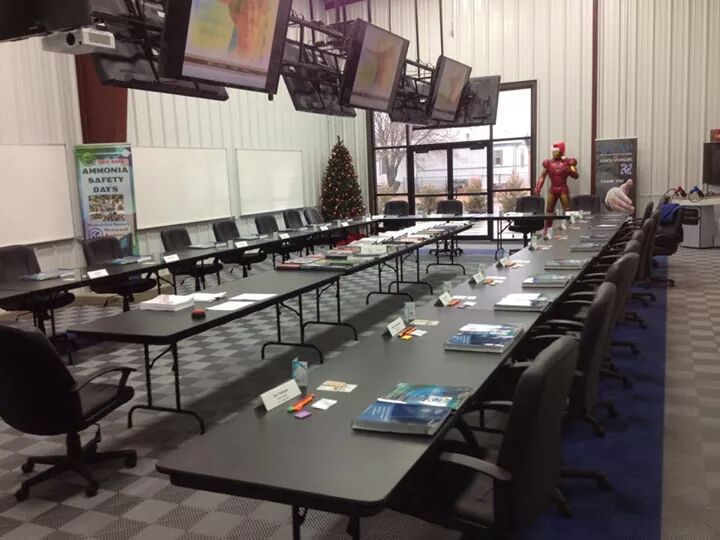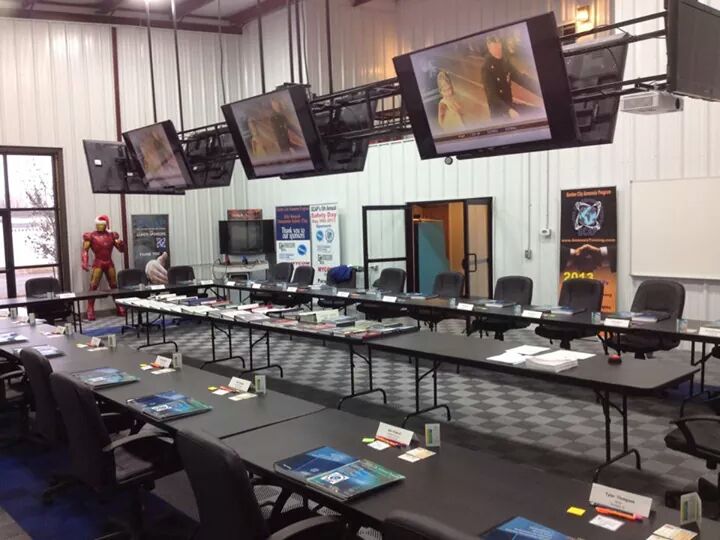Archive for December, 2014
GCAP’s Wrap Up of 2014
by Jeremy Williams on Dec.15, 2014, under News
GCAP’s New Classroom Finished
What a way to finish 2014. Thank you all for your support and GCAP’s staff to make opening doors of our new expansion possible this year. We will be hosting our first class in the new classroom starting this week.
Click Here for the 2014 News Update
GCAP is looking for an Industrial Electrician
by Jeremy Williams on Dec.10, 2014, under News
GCAP is growing with industry demand. We are currently looking for an industrial electrician to become part of our team. This position would be involved with day to operation and expansion related to all electrical needed at our facility with chances of also moving into an instructor position for current and future classes.
Key Duties and Responsibilities:
- Run conduit, wiring, hook-up disconnects, switches, push buttons, circuit panels, breakers, suppressors, transformers
- Read engineering drawings and schematics; while also keeping them up to date
- Maintain and troubleshoot PLC sensors
- Troubleshoot electrical problems on all refrigeration equipment
- Assist in general construction duties
- Assist as a Support Instructor and move into Lead Instructor Status
Send Resume to ammonia@pld.com attention Electrician Position
Come be apart of the best team in the industry!
Free Ammonia Refrigeration Online Training
by Jeremy Williams on Dec.08, 2014, under News
We just wanted to let everyone know that Garden City Ammonia Program (GCAP) has largest discussion forums in the industry through Linkedin. Linkedin.com is a professional website that allows posting of resumes, discussions, and news that could be related to your industry.
GCAP has created groups called “Ammonia Refrigeration Operators”, “Boiler Operators”, and “Natural Refrigerants”. These groups are designed for anybody in field of Ammonia Refrigeration or Boiler Operations. We have started to get a collection of operators, engineers, managers, safety manager, OSHA, EPA, etc… to join the group. We now have over 12,000 total members.
We are inviting you to come check it out. You can read discussions, news and/or create you own discussions of information pertaining to the industry. Over 100 videos have been submitted directly relating to ammonia and boilers. You can also help by giving answers to questions posted to the group. We believe this group will increase your connections in the industry.
-
If interested in joining “Ammonia Refrigeration Operators” go to this direct link.
https://www.linkedin.com/groups/Ammonia-Refrigeration-Operators-2320633/about
-
For the group “Boiler Operators” you can go to this direct link.
https://www.linkedin.com/groups/Boiler-Operators-2682100/about
-
For the group “Natural Refrigerants” go to this direct link.
https://www.linkedin.com/groups/Natural-Refrigerants-3646421/about
If that does not work for you, you can also join by going to their home page. www.linkedin.com. Create your profile by submitting your email address and a password. Search for: “Ammonia Refrigeration Operators” in the group tab. Once you find the group, request to join. Your request to join the group will be sent to us and we will confirm you as a member.
Thanks for you time and wish you the best of luck for 2015 from the staff here at GCAP
Jeremy Williams, GCAP
Directing Manager / Instructor
www.AmmoniaTraining.com
620-271-0037
ammonia@pld.com
30 Years Later: CSB Safety Message Warns it Could Happen Again
by Jeremy Williams on Dec.02, 2014, under News
The video entitled “Reflections on Bhopal After Thirty Years” chronicles how on December 2, 1984, water inadvertently entered a storage tank containing more than 80,000 pounds of methyl isocyanate, or MIC, which reacts react violently with water. A subsequent runaway reaction overheated the tank and resulted in a massive toxic gas release. A dense, lethal cloud drifted over the city of Bhopal exposing hundreds of thousands of people to deadly MIC and other chemicals.
[youtube width=”480″ height=”320″]https://www.youtube.com/watch?v=HZirRB32qzU#t=327[/youtube]
An estimated 3,800 people died immediately, and tens of thousands were injured. Eventually thousands more died from toxic gas-related illnesses – the release eventually killed tens of thousands of people.
In the wake of Bhopal, Congress enacted new laws to increase chemical emergency preparedness and to require companies to develop process safety and risk management programs, and to report their worst-case release scenarios. Congress also established the Chemical Safety Board to independently investigate chemical accidents and recommend measures to prevent such catastrophic accidents. But despite these actions in the 1990’s, the United States continues to experience serious chemical accidents.
In the video, CSB Chairperson Rafael Moure-Eraso says, “Process safety management regulations are in need of reform. There must be more emphasis on preventing the occurrence of major chemical accidents through safer design. Responding to emergencies and punishing people after the fact are not enough.
In the past few years, CSB investigations have found deficiencies in design and process safety management similar to those uncovered in Bhopal. The video points out that a 2008 explosion killing two workers and injuring eight others at a pesticide plant in Institute, West Virginia found that incomplete operator training and procedures similar to Union Carbide’s at Bhopal.
Furthermore, had the Institute plant vessel that exploded taken a different trajectory, pieces of it could have struck piping connected to a storage tank containing 13,700 pounds of MIC, potentially causing a large release of the same highly toxic chemical that killed thousands in Bhopal.
The safety message discusses a number of additional accidents currently investigated or previously investigated by the CSB which ultimately could have been prevented had current federal and state regulations focused on preventative measures or continuously reducing process risks.
To enhance safety in the chemical industry, the Board has voted to include “Modernize U.S. Process Safety Management Regulations” on the CSB’s list of most wanted safety improvements.
Chairperson Rafael Moure-Eraso concludes the video with the following call to industry and regulators, “Since Bhopal, both industry and government have increased their efforts to prevent major chemical accidents. But multiple CSB investigations show that much more needs to be done to assure that future tragedies will be avoided.”
The CSB is an independent federal agency charged with investigating serious chemical accidents. The agency’s board members are appointed by the president and confirmed by the Senate. CSB investigations look into all aspects of chemical accidents, including physical causes such as equipment failure as well as inadequacies in regulations, industry standards, and safety management systems.
The Board does not issue citations or fines but does make safety recommendations to plants, industry organizations, labor groups, and regulatory agencies such as OSHA and EPA. Visit our website, www.csb.gov. For more information, contact public@csb.gov.










